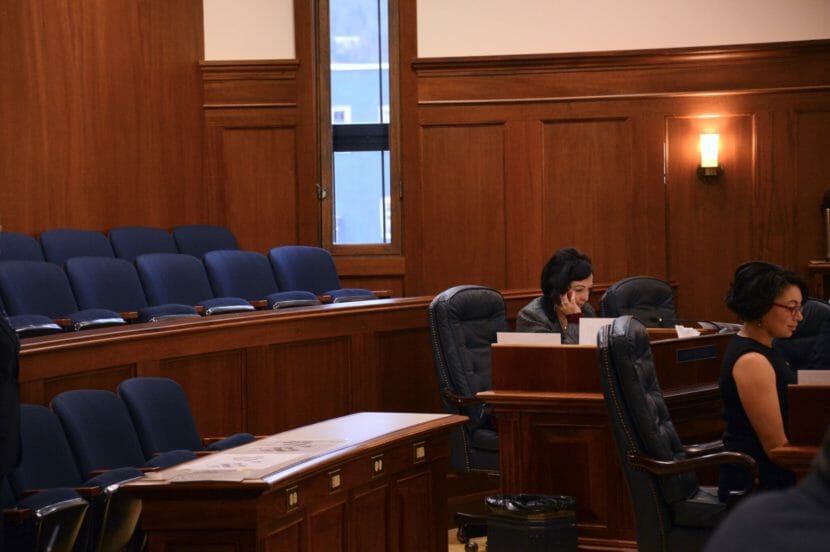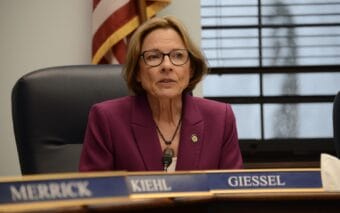
Sen. Shelley Hughes thought she’d be on the Senate Education Committee. She said Senate President Gary Stevens had asked her to be on it and she agreed.
“He has a real heart for the kids and education as I do also, so he was really happy when I agreed, and he called me probably a couple more times, ‘Hey, I’ve got you down. Just want to make sure you’re OK.’ Yes. And then another call, ‘OK, we’re good to go,’” Hughes said Wednesday.
But Hughes, a Palmer Republican, is not on the Education Committee. She said she didn’t know that until the Committee on Committees report came out Tuesday — the first day of the session — and her name was not on the standing committee list. Not on education, not on any standing committee.
Hughes said it felt like a kick in the gut: “It was a shock.”
Hughes is starting her 11th year as an Alaska legislator. Last year, she was majority leader and sat on five standing committees, including education; three joint committees, including the influential Legislative Council; three finance subcommittees; and two other committees. This year, she’s on one special committee — the Special Committee on World Trade.
Hughes, Sen. Mike Shower and Sen. Robert Myers are part of a three-member unofficial minority. Without five members, they are not an official minority, as defined by the Legislature’s rules. That means there’s no minority leader, no minority press officer.
“Somebody always has to take the turn on the minority. And, you know, it rolls around,” Hughes said. “It’s my turn this time.”
Stevens, a Kodiak Republican, is Senate president and heads the 17-person bipartisan supermajority, which controls the 20-member Senate. He said he intended for Hughes to be on the education committee.
“She’s an excellent member of the Education Committee. She has really made a tremendous contribution to that committee over the years so I would love to see her back on education,” Stevens said Wednesday.
Likewise for Shower on the State Affairs Committee, which he chaired last session, and Myers on Transportation, which he chaired. Myers did receive a chair on the Transportation Committee and is the only non-majority member to get assigned to a standing committee.
“The caucus made the decision not to give positions to the other two — to Shower or to Hughes,” Stevens said.
“I’d like to have them on a committee, but the caucus was quite upset about the way that they have been going on talk radio and saying a lot of negative things and even mean-spirited things about other senators. You know, you really should not be doing that. If you disagree with someone, that’s fine, but they should not go beyond showing a disagreement. You should not question someone’s character or — really, it’s just a matter of getting along with people,” Stevens said.
Hughes denied doing that on various commercial talk radio shows in the state: “I focus on policy and process and don’t name names.” She said she’s disagreed with other senators and has differentiated herself. During election season, she threw support for some candidates and not others, but she “didn’t go trash” anyone.
“I don’t agree that I crossed the line that’s inappropriate. I think it is fine to say you disagree,” Hughes said.
Shower has been absent in the Capitol the first two days of the Legislature and did not respond to text messages from the Beacon.
When four Democrats were an unofficial minority in 2015 and 2016 because they didn’t have the necessary five seats to be an official minority, the majority assigned committee seats to all of them.
Stevens said committee makeups could change. There’s no timeline, he said, but it could be revisited in three to four weeks. Ultimately Stevens would like Hughes and Shower in committees in which they can contribute.
“I have to see how things turn out. I want to make sure that they’re willing to work with us and to not be destructive of individuals or personalities,” he said.
Stevens said he wouldn’t classify not being assigned to a standing committee a form of punishment, “but I don’t know how else you would classify it.”
“The Senate is a very collegial body and it has to work together. And if people aren’t able to respect others, then this is what happens,” Stevens said.
A binding caucus
Stevens said the caucus of eight Republicans and nine Democrats is a “binding caucus,” “which says that if you’re going to stay in the caucus, you have to vote for the budget.” It also means, he added, “you agree to support the president and his rulings from the chair.” If a member doesn’t do those things, they should withdraw from the caucus, he said.
He said the Senate hasn’t been able to depend on Hughes, Myers and Shower to support the budget. In 2021, the three senators voted against the budget; in 2022, they voted for it.
Myers, a North Pole Republican, said he was offered a position in the majority and turned it down. Wasilla Republican Sen. David Wilson said he invited Myers to join the coalition.
Wilson, himself, said it took him a few days to decide whether or not to join the coalition. He sought guidance from several state and community leaders and decided that it would benefit his constituents to be part of the majority.
“We came to that conclusion, that being in the coalition was the best outcome to give a voice to my district,” Wilson said.
For Myers, though, being part of a binding caucus is a no-go.
“I campaigned against the binding caucus in 2020. And that’s still a relatively big issue for a good chunk of my voters. And in my view, my vote belongs to my conscience and to my constituents,” he said. “I can sleep with myself better at night, look myself in the mirror if I’m open and upfront and honest and say, I’m going to vote on something based on the merits not because of an agreement I made beforehand.”
An unrecognized minority
Post-election, Myers said he was not surprised to see a coalition form, but “I did not expect it to reach supermajority status like that.” And, he said, it’s pretty clear “they’re shutting us out of pretty much everything.” In the past, he said, minority members have been given standing committee assignments.
Myers is on the Transportation Committee and hopes he can do meaningful work there, though he said it’ll be dependent on the chair — Anchorage Republican Sen. James Kaufman — and what bills get introduced.
Myers plans to prioritize communicating with constituents about what’s happening during the session and “just see what kind of opportunities pop up.” He isn’t sure how being part of an unrecognized minority will go, but “we’ll muddle through for now at least.”
Sen. Bill Wielechowski said the three senators can still be actively involved and have a say.
“You’re always welcome to come in and have a conversation with people whether you’re on a committee or not on committee. Because, ultimately, if you don’t agree with something that’s going through the process, then you can run an amendment on the floor. I mean, there’s plenty of opportunities. And, quite frankly, a lot of the opportunities happen in legislators’ offices, speaking with people,” Wielechowski said.
Hughes said the three members who are outside of the majority have advantages over those who are in it.
“We have a stronger and better relationship with the governor than the majority has. We have a stronger and better relationship with the House Republicans, so half the House. So, we have things definitely working in our favor,” she said.
“We actually are not going to be twiddling our thumbs all the time,” Hughes said.
This story originally appeared in the Alaska Beacon and is republished here with permission.


